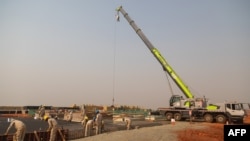In the post-World War II era, more than 40 per cent of internal armed conflicts have been linked to the exploitation of natural resources, which are essential to achieving sustainable development, according to the United Nations. The problem is exacerbated by increasing demand. At the same time, climate change, biodiversity loss and pollution, poor resource management, scarcity and unequal access, aggravate the competition over access, use and control of natural resources.
“The United States recognizes the connections between climate change, natural resources, peace, and security,” said Stephanie Sullivan, United States’ Acting Deputy Permanent Representative to the United Nations. As it is, there is a need “to assess and manage the full range of conflict risk factors that climate change is likely to exacerbate.”
“This would be supported by the adoption of a strategy that incorporates comprehensive risk assessments, data utilization, and analytics to build resilience,” she said.
“No one government or international organization can respond to these challenges alone,” said Ambassador Sullivan.
“Effective conflict prevention mitigates drivers of instability and requires partnerships, sustainable resources, national ownership, and the meaningful inclusion of marginalized communities, including women and youth. It must cut across sectors to properly address the root causes of conflict.”
It is crucial that women be included in any discussion with regard to the prevention, management and resolution of natural resource-related tensions. Because they manage and work with natural resources in many fragile and conflict-affected regions, women can contribute front-line perspectives that will inform comprehensive, effective, and enduring conflict prevention strategies. “Enhancing women's full, equal, meaningful and safe participation in policy- and decision-making processes amplifies these prevention efforts, promoting lasting peace and security amid environmental and climate challenges,” according to a UN report.
Indeed, said Ambassador Sullivan, “Women and girls are disproportionately affected by climate change and conflict.”
“Gender is key to the design of inclusive policies that tackle inequality, discrimination, and conflict prevention. The United States will continue to prioritize UN efforts aimed at fully inclusive conflict prevention with women participating fully, equally, and meaningfully,” she said.
“The United States stands ready to consolidate our efforts to advance a systematic, responsive, and evidence-based approach to these challenges,” said Ambassador Sullivan.
“More broadly, the international community needs to build effective, science-based management of natural resources themselves, and ensure that its activities are environmentally and socially responsible, well governed, gender-responsive, and climate-resilient.”






